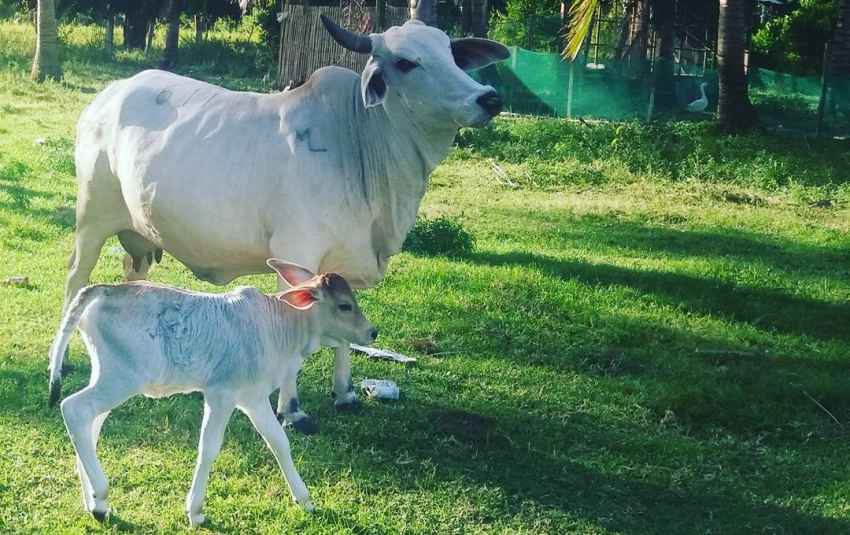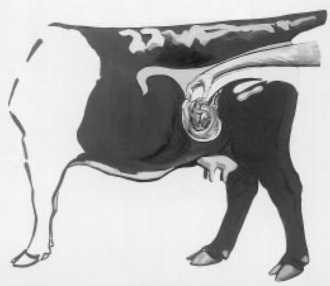Breeding cows is a complicated process that involve a specific set of guidelines. However, before you start breeding your livestock, it’s essential to fully understand how long cows are pregnant for. This will allow you to plan and make the proper precautions, so all your young calves are born healthy and without complications. So, lets start by tackling the first question, how long are cows pregnant?
What is a cow’s pregnancy length?
Like humans, cows are pregnant for a typical time period of 9 months or 38 to 44 weeks after the conception process has been complete. However, the time between conception to the final birth for each individual cow is usually the same every time they get pregnant. For example, if it takes 40 weeks for a cow to give birth, it’ll generally take that same amount of time every following pregnancy. Farmers who keep a log with the pregnancy times of each cow will be able to plan and prepare much more effectively.
To successfully acquire the pregnancy times for each cow, farmers will typically rely on artificial insemination. Once they know the timeframe, then they will let the cow begin to breed on its own. Another method farmers employ is what they call a “clean up” bull. Because artificially insemination isn’t always 100% effective, farmers will also use a “clean up” bull. This bull is put in a pen of cows that have already been artificially inseminated. Any cow that didn’t get pregnant through this artificial process will now be inseminated by the bull. Farmers usually use this bull on average of about 1 to 2 months.
Once the “clean up” bull has been used, farmers will wait about a month to make sure each cow became pregnant. Farmers can also tell if the cow became pregnant from artificial insemination or the “clean up” bull by simply analyzing the size of the fetus. By being able to see what method worked better, farmers can determine when their cow’s breeding season specifically takes place. In general. Cows that have been artificially inseminated will give birth earlier than cows that were impregnated by the “clean up” bull. These useful tactics makes planning and preparing a much easier job.
How long are each of the pregnancy stages?
By understanding each of the pregnancy stages, you can better plan and prepare. So, what are each of the pregnancy stages and how long do they each last? Although a cow’s pregnancy will typically last anywhere from 38 to 44 weeks, the gender of their babies, the number of babies they’re pregnant with, and the breed of the cow will ultimately determine the overall length.
☆The first stage last up to 3 months. During the first 21 days, there’s a 30% chance of the cow having a miscarriage. However, after 42 days, the chance of a miscarriage drops down to 6%. Farmers should keep a close eye on their pregnant cows during this period. If the fetus is healthy, it’ll be the size of a mouse at the end of the 3 months.
☆The next stage is 3 to 5 months. During this stage, the fetus can not be fully examined but the basic structure of the body can be touched. Although miscarriage can still take place during this stage, the chances are a lot less likely than the first 3 months.
☆Now, we have the 5 to 7-month stage. This is a very important stage. Why? During this time, the fetus will need to get the right amount of nutrients and vitamins to ensure proper growth and overall health. Failing to do so could result in malnutrition, birthing problems, and even a miscarriage. In addition to this, making sure your pregnant cow is getting enough nutrients and vitamins is also essential to the quality and the amount of milk produced. During the 7th month, the fetus is now the size of an average cat.
☆The last period is the 7 to 9-month stage. As the fetus gets closer and closer to being born, the nutrient and vitamin necessities become even more demanding. If you’re wondering why that is, it’s because 70% of a fetus’ growth takes place during this pregnancy stage. To ensure the fetus will be born as healthy as can be, farmers also quit milking the pregnant cow on average 45 to 60 days before the fetus is born.
Once the cow is at full term, the fetus can weigh anywhere from 50 to 100lbs and is about the size of a medium-sized dog. During this time, the fetus’ need for additional protein greatly increases. Without it, the calf may be born malnourished and very weak.
How long is labor?
The first phase of the birthing process is cervical dilation. This can take anywhere from 2 to 6 hours. During this time, the cow giving birth will more than likely be weak, distressed, and a little anxious. The actual delivery of the fetus will take anywhere from 30 minutes to 2 hours to complete. Once the calf has been born, the mother cow will clean it’s newborn with her tongue.

Determining stage of pregnancy
Now that you know how long cows are pregnant for and the different stages of pregnancy, it’s important to fully understand how to determine whether or not your cow is in fact actually pregnant. If you have absolutely no experience in this area, it’s best to call a professional palpator. An individual with this level of experience can determine whether your cow is pregnant as early as 30 days after the breeding process has be complete. If you know approximately what time of year your cows tend to become pregnant, you’ll want to share that with your palpator.
An experienced palpator will start by carefully feeling the cows stomach. At 30 days, the palpator will have to be extremely gentle, because the fetus at this stage of the pregnancy can be harmed quite easily. It’s a very delicate life form, and if the palpator you’ve hired is not very experienced, they should probably wait a few more weeks before they begin to inspect your pregnant cow. You really have to know what you’re. Too much pressure could result in a miscarriage.

Position of 90-day fetus.
When determining pregnancy, there’s one important rule you’ll want to consider. When a cow has been pregnant for 90 days or less, you’ll want to examine the pelvic cavity and not the pelvic brim or the reproductive track. However, if you think your cow has been pregnant for more than 90 days, you’ll want to examine the pelvic brim. More than likely, you’ll be able to see the bulge a little past the pelvic brim.
How to reduce pregnancy loss in cows?
One of the main areas you’ll want to focus on is the food and the water your cattle are ingesting. Testing the feed and the quality of the water months before you begin the breeding process is definitely a smart decision. Without the proper nutrients and clean drinking water, your cattle will never be able to have health and strong calves. For example, too much iron in your water supply can cause fetus complications while also affecting the quality of the milk. Contaminates like ergot or fusarium in cattle feed can also cause several complications. These are the kind of dangers you’ll want to be on the lookout for.
Another reason why a cow may have a miscarriage is due to an extremely hot environment and going through heat stress. The inability to cool down can cause many complications with the pregnancy. Some farmers put up sprinklers systems while others have planted several shady trees. There are a number of solutions, but if your cattle are in the sun on a real hot day, you’ll want to provide them with some way to cool themselves off.
Diseases are another cause of pregnancy loss in cattle. One of the most common includes the BVD Virus. This virus can cause utero infections and reproductive disease in pregnant cows. The worse part? The BVD Virus can spready quite easily and contaminate your whole livestock. The best way to avoid problems like this is to have your vet give your cows the right vaccines. If you do notice that your cows look a little sick, make sure you call your vet right away. Do not hesitate one bit.
Lastly, when the calf is in the process of being born, if it should happen to come out with it’s leg or head back, a stillbirth could result. For those who don’t know what a stillbirth is, it’s the loss of pregnancy after 28 weeks of pregnancy. To avoid a stillbirth, you’ll want to make sure that you have an experienced vet help you deliver the calves unless you have the proper experience yourself.
So, how long are cows pregnant? In summary, cows are typically pregnant from about 38 to 44 weeks, and with the proper nutrition, environment, and veterinary care, the chances of your cows successfully giving birth to healthy calves are extremely good.
- Can Chickens Eat Pineapple? Is It Healthy for Them? - February 21, 2019
- What Is a Wether Goat, and What Are the Benefits of Owning One? - February 12, 2019
- What Is the Largest Chicken Breed? Here Are the Top 10 Biggest Breeds - July 1, 2018
